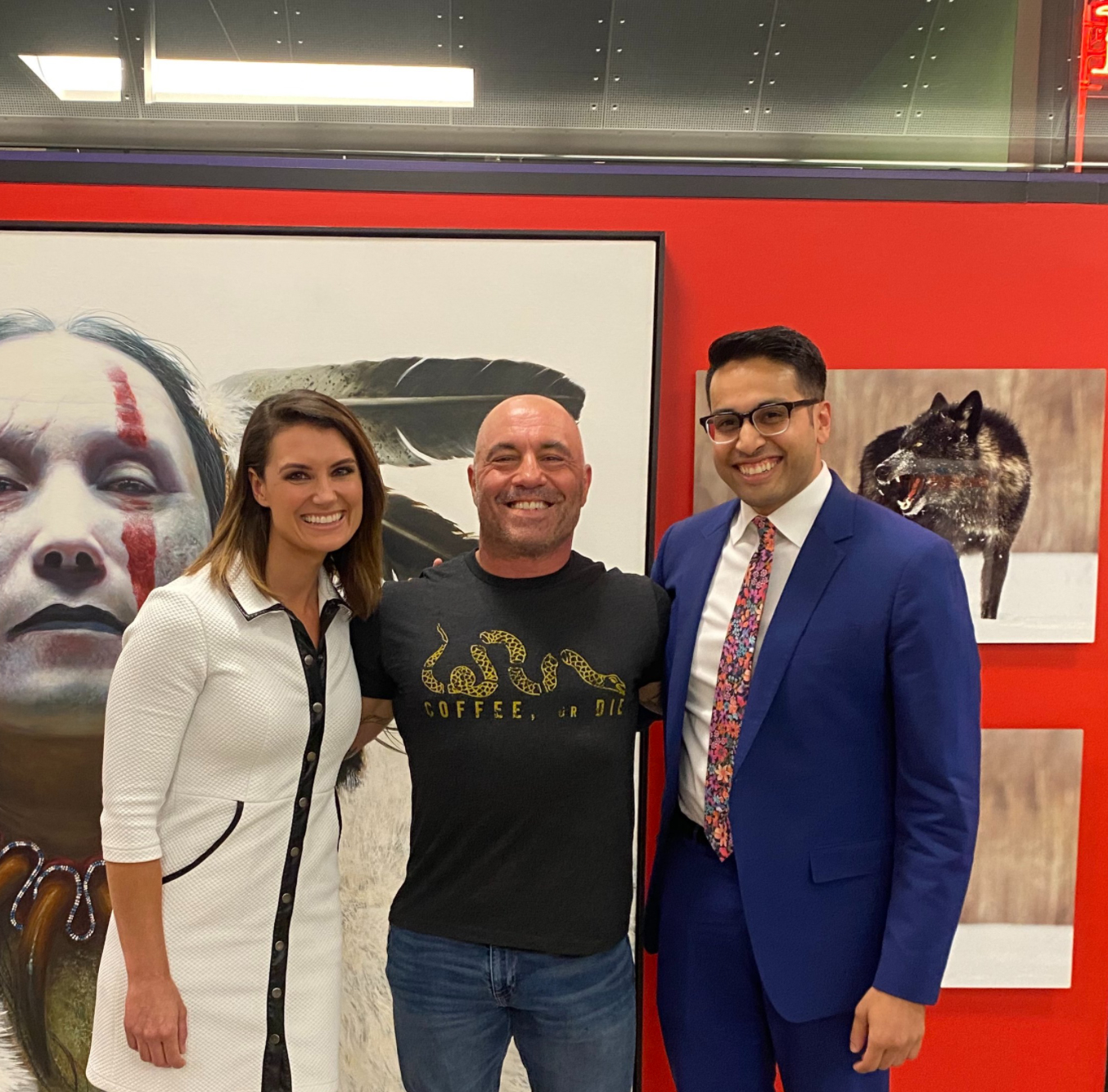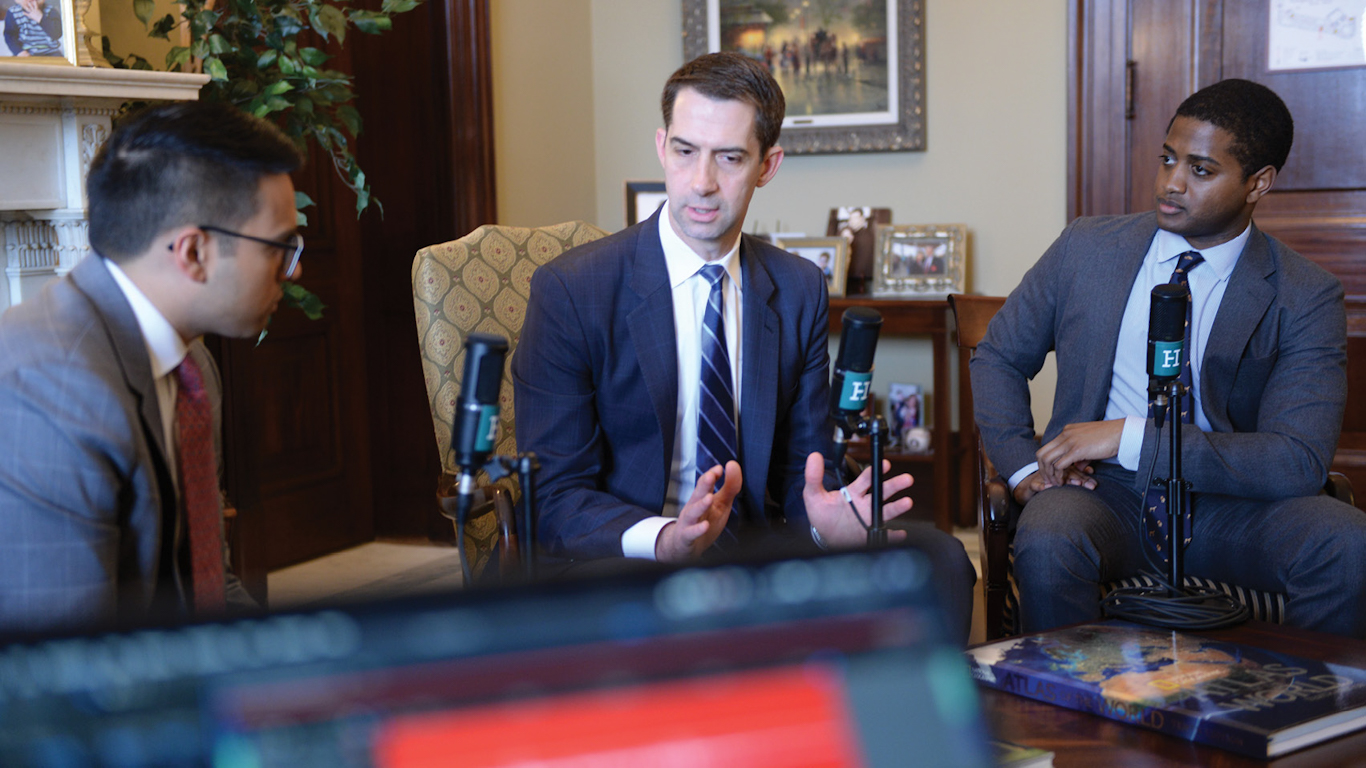WASHINGTON — Saagar Enjeti and Krystal Ball are the new king and queen of alternative media. After having just quit The Hill to go fully independent, their new show “Breaking Points” immediately debuted at number one in the global politics podcast charts, comfortably overtaking well-established brands like “Pod Save America” and “The Ben Shapiro Show.” They even received the ultimate plug with an appearance on and an endorsement from Joe Rogan, a veritable blessing from the pope of pop culture.
“Breaking Points” is effectively a copy of “Rising,” Enjeti and Ball’s show on The Hill. “Rising” had the look and tone of a cable news show, with two well-presented and attractive hosts chatting to guests in a brightly lit studio. But it had far more substance, featuring stories and points of view that are completely ignored in the rest of corporate media. The two invited on a range of informative guests the caliber of whom is simply not found on cable news. Thus, it had a jarringly subversive quality that appealed to viewers, as if the two were smuggling forbidden but increasingly popular ideas all while maintaining a polished, corporate feel.
1/ It's been 1 month since @krystalball and I announced Breaking Points. In that month we have nearly half a million subscribers on Youtube, became the number 1 political podcast in the country, and routinely trash cable news primetime in overall/key demo numbers pic.twitter.com/K7R7lpAUTJ
— Saagar Enjeti (@esaagar) July 1, 2021
Ball is a progressive while Enjeti is a conservative. Nevertheless, both present themselves as populists who have a lot in common, something that was the central message of their bestselling book, “The Populist’s Guide to 2020: A New Right and Left are Rising.” While Ball’s political outlook could be described as relatively standard, Bernie Sanders-style populism, Enjeti is more of an enigma. While he identifies as a conservative Republican, he also labels himself a pro-worker, pro-union populist.
Key to his appeal is convincing progressive audiences that, although a conservative, he is still a political outsider with views not too dissimilar from their own. Yet a look into Enjeti’s background and professional career suggests otherwise — that he is very much an insider and is pulling a similar trick to so many Republicans of late who are rebranding as anti-elite, anti-deep state warriors, all the while mainstreaming some highly problematic viewpoints to his audience.
A neocon in the making
Before becoming a populist media personality, Enjeti appeared to be training for the role of deep state official, pursuing an undergraduate degree at George Washington University and a master’s degree in security studies at Georgetown University, both D.C.-area colleges well known for their connections to the national security state. Enjeti also decided to study counter-terrorism studies at Israeli university IDC Herzliya. Situated on a former military base, the university’s board boasts a former head of Mossad and ex-Prime Minister Ehud Barak. Meanwhile, its international advisory board is replete with U.S. national security leaders, such as Robert Hutchings, former chairman of the National Intelligence Council; Stephen Peter Rosen, one time director of political-military affairs at the White House National Security Council; and ex-CIA Chief R. James Woolsey.

The master’s program in counter-terrorism studies features modules in profiling terrorists, strategy and deterrence, Arab language, Iranian studies, and a course called “Hezbollah: a hybrid terrorist organization.” This is an institution that trains Israeli and American intelligence officials, not radical populist outsiders.
The counter-terrorism studies department is headed by Dr. Boaz Ganor, an Israeli government advisor. During the latest Israeli assault on Gaza, IDC Herzliya’s president sent out a message to students condemning the Gazans’ supposed wanton aggressiveness. “These rockets were fired at a civilian population with the intent to kill,” he seethed. Luckily, he said, with the help of Dr. Ganor and coordination with the Israeli American Council and the use of ACT.IL — an Israeli government-funded app, which, as MintPress reported in May, helps Zionists artificially infiltrate online conversations and flood them with pro-Israel messages — public opinion was holding firm.
Gonna study war some more
While still in university, Enjeti landed a job at the Institute for the Study of War (ISW), writing policy briefs about the conflict in Afghanistan and analyzing the moves and strength of the Taliban. The ISW is a notoriously hawkish think tank funded by weapons contractors like Raytheon, General Dynamics and DynCorp, its board filled with retired generals and infamous neoconservative warmongers like Bill Kristol.
Robbie Martin, a filmmaker whose movie series “A Very Heavy Agenda” deals with the rise of neoconservatism, told MintPress about his misgivings:
The Institute for the Study of War is one of the most enmeshed D.C. think tanks in terms of active military policy with the U.S. government. It is probably the most influential military-centric think tank in Washington. It is always encouraging war, which should be obvious by its name.”
ISW officials were at the wheel in the drive towards war in Iraq and have since called for more aggressive actions in Syria and other nations. The organization also served as embedded advisors for Gen. David Petraeus while he was commander in Afghanistan. The ISW was created by the Kagan family, a group of the most influential hawks in Washington. As Martin explained, Donald Kagan is a neocon patriarch, helping to craft the infamous Project for a New American Century document “Rebuilding America’s Defenses” which called for a “new Pearl Harbor” and set out the neocon imperial agenda for the Bush administration. His son, Fred, was the brains behind the 2007 Iraq “surge” — the dramatic increase in U.S. troop numbers in the country. Fred’s wife, Kim, a military officer and historian, founded the ISW. Meanwhile, Donald’s other son, Robert is a media pundit most noted for being the driving force falsely linking Saddam Hussein to the 9/11 attacks, an assertion that helped grease the skids for the Iraq invasion.
Robert’s wife, Victoria Nuland, is arguably the most powerful neocon of the clan. Having held a host of high government positions — including Ambassador to NATO, Assistant Secretary of State for European and Eurasian Affairs, and Under Secretary of State for Political Affairs — Nuland has been involved in virtually every U.S. intervention in the last 30 years, and was previously crowned “Queen of the Chicken Hawks” by writer Rick Sterling.
Queen of Chicken Hawks: Victoria Nuland Had A Hand in Every US Intervention in the Past 30 Years
From the ISW, Enjeti later moved to the Hudson Institute, an equally neoconservative and pro-Iraq War think tank, where he worked as a media fellow until last year. Like the ISW, Hudson takes money from a cavalcade of weapons manufacturers, including Raytheon, Northrop Grumman and Lockheed Martin.
The Hudson Institute is a standard-bearer for establishment Republicanism, as can be seen by a mere glance at its senior figures. Hudson’s president and CEO, John P. Walters, is a longtime Republican official, serving, among other roles, as George W. Bush’s drugs czar. Its senior vice president is Scooter Libby, Vice President Dick Cheney’s chief of staff. As soon as he left office earlier this year, Secretary of State Mike Pompeo also walked into a senior position at the organization.

Until recently, Enjeti’s second podcast, “The Realignment,” was an official Hudson publication. Hosted with fellow Hudson employee Marshall Kosloff, the two lob softball questions to reactionary guests like Mike Pompeo, Niall Ferguson and Douglas Murray. The concept of the show is that there is a profound political realignment happening in America right now, as old political demarcations are broken down and new ones form. In this sense, it is a similar notion to “Rising” and “Breaking Points,” except that it is being pushed by one of the most establishment-conservative organizations in America, raising questions about how genuine this realignment really is.
Fellow Hudson employee Kosloff is perhaps best known to progressive audiences for making an unwanted appearance in the documentary film, “The Lobby”, which exposed Israeli government interference in domestic U.S. politics. Kosloff is seen being paid to attend astroturfed protests against the Students for Justice in Palestine Movement. At one point he jokes to an undercover reporter that all it took was “$50,000 plus benefits” for him to sell out to Israel, a reference to his salary another conservative foundation which pays him to be, in his colleague’s words, a “foot soldier in the conservative movement.” To be fair to him, Kosloff appeared to have serious concerns about the stunt, not because of ethics, but in case he was caught on camera doing so. “This is bad for my political career” he worries. Considering where he is now, his fears were perhaps unfounded.
In Martin’s view:
Before Saagar was the co-host of ‘Rising’ with Krystal, ‘Rising’ was not a populist-themed political show at all. It was not really that progressive. And when Saagar got there it almost seemed like it became a TV-show version of this podcast.”
Enjeti presents himself as an anti-war populist. “The entire reason I am interested in politics is because of 9/11 and opposition to the war in Iraq. It is my North Star and always will be,” he said in a recent episode of “Rising.” But this is difficult to square with the fact that he chose to study counter-terrorism in Israel and to work for two of the most hawkish neoconservative think tanks in America — the very same think tanks whose principals laid the groundwork for the wars in Iraq and Afghanistan that Enjeti claims so vociferously to oppose. That an anti-war outsider could choose to work for the likes of the Kagan family does not compute.
A Hudson obsession
On foreign policy, Enjeti seems to have been at least partially influenced by the Hudson Institute’s stances. If there is one issue the think tank concentrates on most, it is China. In recent years, they have become almost obsessed with opposing it. The word “China” and its derivatives appear 137 times in the organization’s most recent annual report, featuring on virtually every page.
In a recent interview with Fox News, Hudson Senior Fellow and China expert David Asher demanded that the U.S. bring the country “to heel,” as if it were a dog. Treating the lab leak hypothesis as an “undisputed fact,” Asher railed, “we’ve got to hold the Chinese accountable.” We have to “fix what the Communist Chinese did to try to undermine our country and the world system, with COVID,” he explained. The friendly Fox News anchor asked if sanctioning the country and relocating the 2022 Winter Olympic Games would be enough punishment. “Probably not,” Asher replied, leaving the possibility open for war.
Left unstated in all this is that Hudson has flourished and rapidly expanded thanks in no small part to huge donations from the independence-minded government of Taiwan. Between 2015 and 2019, the organization’s revenue more than quadrupled to $57.1 million.
Hudson does not disclose how much Taiwan is giving them, except to say that the island has been on its list of highest-tier donors every year since they began divulging their sponsors in 2015. Not coincidentally, Hudson is among the most vociferous supporters of greater Taiwanese independence.
Hudson appears, however, to accept even more money from bitter China enemy Japan. In 2020, the organization’s then-CEO Kenneth Weinstein was chosen as U.S. ambassador to Japan, although the appointment later fell through. Hudson also takes money from other China-hostile countries like South Korea.
Tanks and Think Tanks: How Taiwanese Cash is Funding the Push to War with China
The populist’s guide to hating China
Many critics have argued that true economic populism cannot be conservative and that right-wing populist variants attempt to unite a majority around issues of religion (as in Modi’s India) or race (as in Nazi Germany), deflecting popular frustration downwards and using minorities as scapegoats for the country’s problems.
Enjeti has tried to square the circle of raging against the elites while leaving the system in place by blaming so many of America’s failings on China, combining populist rhetoric with Hudson-style foreign policy. In “A Populist’s Guide to 2020,” he claims that the malaise the country is in can be explained as in no small part due to “China’s economic warfare.”
The bad guys in Enjeti’s story of American corporations relocating eastwards to use hyper-exploited Asian workers are not the corporations themselves, nor the U.S. government, but the Chinese Communist Party, deviously convincing businesses to do so — a classic bait-and-switch maneuver.
“Corporations and the billionaire class sold us all out a very long time ago,” he states, sounding like Bernie Sanders, before claiming that doing business with China is akin to “American monopolies’ tacit cooperation with the Nazi regime before the outbreak of World War II.” He concludes:
The people who control our banks, who control what we see, what we laugh at, who we watch play sports, are all now beholden to some very bad people in Beijing. And Beijing isn’t shy about using its economic entanglements with us to try and force American citizens to behave however they’d like.”

In this, he is borrowing a tactic often used by his former boss at The Daily Caller, Tucker Carlson:
Working-class people of all colors have a lot more in common, infinitely more in common with each other than they do with some overpaid MSNBC anchor. And if you were allowed to think about that for long enough, you might start to get unauthorized ideas about economics, and that would be disruptive to a very lucrative status quo.”
No, that was not Bernie Sanders or even Noam Chomsky. It was indeed Tucker Carlson, who often fills his audience with populist-sounding rhetoric, only to redirect legitimate anger away from capitalism and towards woke college students, gypsies or Latino immigrants. For decades, however, Carlson was a preppy, bow-tie-wearing “out-of-the-closet elitist” who described ordinary Americans as “peasants.” The stepson of the heir of the Swanson food empire and the son of Dick Carlson, the head of Voice of America and a U.S. ambassador, Tucker reveled in how “extraordinarily loaded” his family was, condemning Bill O’Reilly’s faux populism as phony, only to switch to exactly the same schtick when he replaced O’Reilly on Fox News in 2017.
While “Rising” has a distinctly progressive audience, Enjeti has been pushing the Hudson’s neoconservative talking points on foreign policy. Enjeti is an unabashed imperialist who wants the United States to control the planet. As he stated himself on “The Realignment:”
I am not for a multipolar world…I want to be the only blue water navy, I don’t want the Chinese ruling the Straits of Malacca and the South China Sea.”
In early 2020, Enjeti delighted in using the racist term “the China Virus” for COVID-19, telling “Rising” viewers that it is “the height of cynical political correctness” to get outraged at it.
In a long soliloquy about wrestler John Cena correcting his (inaccurate) statement that Taiwan is an independent country, Enjeti again tried to launder aggression against China as a progressive position. “The elites of this country do not work for us, do not really like us and are completely for sale,” he roared. For sale to whom? Not to the likes of Jeff Bezos, the government, or giant corporate interests, but to the “authoritarian and cultish” Chinese Communist Party. “The Chinese have achieved total victory,” he exclaimed; “They are able to control the very speech that comes out of the most powerful people in America’s mouths.” That Cena, an American, would apologize for such a huge faux pas — akin to traveling to Kiev to announce “Ukraine is forever Russia” — is seen only as more proof that the U.S. is secretly under Chinese control.
Undisclosed in all this is the gigantic conflict of interest inherent in the fact that Enjeti’s salary at the Hudson Institute came courtesy of piles of cash donated by the Taiwanese Foreign Ministry.
In case you're wondering what's truly motivating this, here's Saagar in his own words: pic.twitter.com/vYkwvpmXbe
— Sam Sacks (@SamSacks) May 26, 2021
As soon as Joe Biden won the election, Enjeti was warning that he was secretly a Chinese asset, and using faux populist language to do so. “Big business is wholly in bed with the Chinese Communist Party,” he explained, warning that “China will use Wall Street to control Joe Biden,” as if the president of the United States, the most powerful man in the world, is a mere puppet of a foreign country halfway around the globe. He also praised Donald Trump for “changing the conversation around China.”
Earlier, Enjeti had tarred Democratic presidential candidate Michael Bloomberg with the same brush. In a segment entitled “Is Mike Bloomberg a Chinese Asset?” he condemned Bloomberg News for supposedly “kowtowing to the Chinese regime” and “covering up the crimes of the Chinese elite.”
If this sort of rhetoric were used against a country like Israel, it would rightly be challenged and regarded as highly suspect. Indeed, when a guest attempted to smear Bloomberg’s opponent Tulsi Gabbard as a tool of Russia, both Ball and Enjeti quickly jumped in to shut it down. Yet Ball, whose strong suit may not be foreign policy, generally stays silent or even agrees with Enjeti’s anti-China tirades.
Unsurprisingly, Enjeti has also been one of the loudest proponents of the lab-leak theory of the origin of the COVID-19 pandemic, recording long monologues about the media’s failure to take it seriously for over a year while inviting neoconservative warmongers like Josh Rogin to discuss China’s guilt. Describing the lab leak as “the most likely explanation for the origin of COVID-19,” Enjeti told viewers that we should be “ten times more skeptical of the Chinese government.” If only we had this knowledge earlier, he laments, American foreign policy would be far different. “The Chinese are expanding all across South East Asia!” he exclaims, implicitly suggesting that some sort of confrontation is an appropriate response, echoing the Hudson line.
While he is undeniably a charismatic and confident host, Enjeti’s schtick is remarkably similar to that of his former employer Tucker Carlson, who also rails against elites while being one of them. Other establishment hawks like General Michael Flynn and General Robert Spalding (another Hudson employee) have also attempted to sell themselves as anti-establishment populist outsiders, but with far less success. Enjeti has been more successful partly because he is a more likable figure and partly because the others have decades-long histories in the heart of the swamp. Yet a deep dive into his background — from a counter-terrorism student in Israel to a Kagan family think tank to the Hudson Institute — shows Enjeti is also far more likely to be a run-of-the-mill conservative cosplaying as a populist than a genuine ally of anti-establishment movements. Unfortunately, people are so desperate for genuine populism that they are willing to swallow anything.
Editor’s note | This article was updated to include information about Marshall Kosloff’s involvement in a pro-Israel lobbying group.
Feature photo | Graphic by Antonio Cabrera – based on an edited photo
Alan MacLeod is Senior Staff Writer for MintPress News. After completing his PhD in 2017 he published two books: Bad News From Venezuela: Twenty Years of Fake News and Misreporting and Propaganda in the Information Age: Still Manufacturing Consent, as well as a number of academic articles. He has also contributed to FAIR.org, The Guardian, Salon, The Grayzone, Jacobin Magazine, and Common Dreams.


